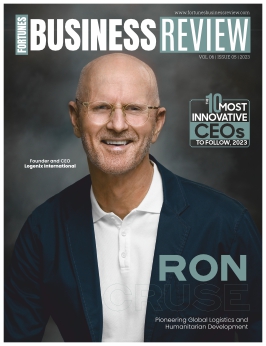Ron Cruse: Pioneering Global Logistics and Humanitarian Development
The 10 Most Innovative CEOs to Follow, 2023

The visionary Founder and CEO of Logenix International, Ron Cruse has emerged as a prominent figure in the world of logistics and humanitarian development. With a remarkable track record spanning over two decades and encompassing more than 80 countries, Cruse has played an instrumental role in shaping the industry landscape. Having previously founded two successful companies, Logenix marked Cruse’s latest venture in 2001. It quickly established itself as a trailblazer, spearheading groundbreaking initiatives in the realms of humanitarian aid, healthcare, and critical infrastructure development. From 2002 to 2012, no logistics firm matched Logenix’s remarkable achievements in Iraq and Afghanistan, solidifying its reputation as an unrivaled force.
Cruse’s influence extends beyond his entrepreneurial achievements. As an author, his book “Lies, Bribes, and Peril” has received high praise for its profound insights into conducting global business. Emphasizing the impact of cultural diversity on business interactions, the book has become a valuable resource in academic institutions nationwide, utilized by both undergraduate and graduate programs.
With a relentless drive for innovation, Cruse continues to shape the future of global logistics and humanitarian development. His pioneering spirit, industry expertise, and dedication to making a positive impact have cemented his legacy as a true visionary in the field. As Logenix International thrives under his leadership, the world can expect continued groundbreaking advancements and a profound commitment to improving lives worldwide.
Journey in Development Logistics and Making a Difference
In the early 1980s, Ron secured a job in New York City with an international logistics company. He quickly found himself overseeing significant contracts abroad. During his time in Egypt and East Africa, Ron acquired valuable knowledge about the immense challenges faced by humanitarian supplies when navigating customs clearance procedures in many developing nations. The magnitude of these issues, both in terms of difficulty and cost, led Ron to the realization that specializing in this particular segment of the logistics market could present an opportunity to make a positive impact while also achieving success. The fact that he has now spent four decades and worked for two companies, generating a total revenue of nearly three billion USD in development logistics, confirms that his initial intuition was accurate.
From Liberal Arts to Global Insights
Having studied at Villanova University, Ron obtained a degree in Liberal Arts, which exposed him to a wide variety of concepts and philosophies while also teaching him the importance of critical thinking, a skill that he considers to be the most crucial aspect of education. Throughout his career, the ability to think critically and solve problems has been vital. Ron has also come to realize that there is a significant educational gap when it comes to the developing world. There is currently no university anywhere in the world that teaches individuals how to navigate and be successful in this realm. This realization prompted Ron to write a book about the profound lessons and insights he has gained from traveling to nearly 90 countries. The book, titled Lies, Bribes & Peril: Lessons for the REAL Challenges of the Global Arena, has received excellent reviews and is used in numerous universities across the country in both undergraduate and graduate courses.
Entrepreneurial Leadership in Challenging Environments
From a logistics perspective, Ron recognizes that the humanitarian development field is fundamentally an entrepreneurial endeavor. The developing world is characterized by constant change and unpredictability. Governments can be overthrown, regulations can change unexpectedly, violence and civil unrest are prevalent, and inadequate infrastructure, such as roads and bridges, presents significant challenges. Effective leadership in this context requires qualities similar to those of an entrepreneur: being innovative, resourceful, and vigilant in identifying challenges. To successfully operate across more than 140 developing countries, Ron’s company prioritizes gathering and sharing intelligence within the organization. They must stay informed about available transportation options and utilities in these countries, coordinating with numerous manufacturing and supply centers worldwide. While daunting, this comprehensive approach is necessary for success.
Ron and his management team understand the importance of adaptability and continuously recognizing changes in the developing world. They maintain a problem-solving mindset and encourage “thinking out of the box.” Collaboration and collective intelligence are vital components of their company culture, as no individual can keep track of the vast amount of information gathered daily. They firmly believe in the adage “two heads are better than one.” In addition to their responsibilities, the staff is granted the authority to implement decisions.
Given the global nature of their work and the importance of firsthand experience, Ron’s company allocates a significant budget for global travel, enabling staff members to visit and gain practical knowledge in countries all over the world.
Essential Traits for Entrepreneurial Success
Although Ron never saw himself as an entrepreneur when he was younger, he later realized that he possessed all the essential traits of successful entrepreneurs. It’s critical for aspiring entrepreneurs to understand the market needs and how to effectively market their solutions to clients, regardless of the industry or discipline. This requires a continual awareness of market evolution and competition to stay ahead of the curve. In Ron’s opinion, these are the strategic elements necessary for entrepreneurial success.
Persistence, resilience, single-mindedness, excellent problem-solving skills, and the internal fortitude to take risks are the essential traits needed for a successful entrepreneurial endeavor. Ron believes that these traits are crucial in creating and evolving a thriving company. However, he also acknowledges that not everyone can be an entrepreneur, and if an individual lacks these traits, especially the ability to assume and live with risk, they may not be able to develop them.
Calculated Risk-Taking
Ron believes that risk-taking can often be minimized by following a “small steps” approach. He views risk as a series of decisions that combine to form an overall venture, rather than a singular, high-stakes decision. Critical thinking and unencumbered decision-making play a crucial role in this style of risk-taking. The ability to quickly change direction and avoid becoming attached to or protective of a bad decision is paramount.
Ron’s first significant risk was establishing his first company. Recognizing the potential of specializing in developing world logistics, he ventured into this niche and successfully became a leader in logistics across the developing world. Another major risk came with the decision to enter the new markets created by the fall of the Soviet Union. Through a series of small steps and reversed decisions, his company quickly gained success and became involved in major programs, including humanitarian operations, dismantling weapons, reactor modernization, and oil, gas, and mining ventures. Within six years, the company’s sales grew from $25 million to nearly $100 million, earning them a spot on the INC 500 list in 1991. Eventually, Ron sold the company in 1996 and retired in 1998.
After the 9/11 attacks, sensing new opportunities in a changed world, Ron founded his current company, Logenix, and rehired the best talent from his previous venture. Through a series of small steps and risks, Logenix began operating logistics in Afghanistan and Iraq, delivering critical supplies for medical clinics, hospitals, and infrastructure projects. Despite the inherent dangers, the company thrived and expanded its work across the developing world, particularly in the management and delivery of life-saving medical supplies. Today, Logenix operates 19 offices in 10 countries and is a leading transporter of public health medicines and medical equipment in the industry. In both of these ventures, Ron’s risk-taking approach involved carefully calculated small steps and agile decision-making to navigate through challenging circumstances and seize opportunities.
Embracing Technological Advancements
Ron acknowledges the vital role of technology in the logistics and humanitarian development industry. He believes that the ability to connect operations and outcomes in a real-time, interactive IT environment across the globe is crucial. To achieve this, Logenix has developed a custom, state-of-the-art in-house IT system, which they consider to be the industry’s best. Ron sees the greatest challenges in the industry revolving around data sharing and the potential evolution of blockchain technology. While he believes that blockchain implementation is still years away, he sees the data sharing revolution happening now. The industry currently relies on Electronic Data Information (EDI), an older technology that can be complex and cumbersome when dealing with high-volume data exchanges. Ron believes that the revolutionary change will involve the implementation of RESTful API, a secure interface for exchanging information between computer systems over the internet. He considers RESTful API superior to EDI in terms of cost, maintenance, and accuracy. Logenix’s current systems are designed to accommodate both the traditional EDI protocols and the new API data transmission protocols. This compatibility allows them to adapt to the changing technological landscape and leverage the benefits of more efficient and streamlined data sharing methods.
Sustainability in Action
In 2022, Ron and his team at Logenix took proactive steps to ensure the company’s operations are sustainable. They commissioned an analysis of the company’s carbon emission profile, partnering with an environmental consulting firm to conduct the study. The analysis encompassed inventorying Logenix’s Scope 1, Scope 2, and Scope 3 emissions, providing valuable insights on effective ways to reduce those emissions. The study also identified best practices for offsetting emissions through transparent programs.
As a result, in 2023, Logenix entered into a contract with Climate Impact Partners to become a Certified Carbon Neutral organization. This commitment entails offsetting 100% of the company’s carbon emissions by the end of 2023. By taking this initiative, Logenix is actively contributing to the reduction of greenhouse gas emissions and addressing its environmental impact.
Furthermore, Logenix is engaging with its largest clients to present solutions for achieving zero emissions in their supply chains. This collaborative effort aims to create sustainable practices and reduce the overall carbon footprint associated with logistics operations. Overall, Logenix is demonstrating its dedication to environmental responsibility by analyzing and mitigating its carbon emissions, pursuing carbon neutrality, and actively working with clients to develop sustainable solutions.
Building Strong Stakeholder Relationships
Ron believes that maintaining strong relationships with stakeholders is critical for the success of any business. This includes investors, customers, suppliers, and employees. To keep these relationships strong, Logenix has implemented regular communication and engagement programs. This includes regular meetings and calls with investors to update them on the company’s performance and plans, regular surveys and feedback sessions with customers to ensure their needs are being met, and regular communication with suppliers to ensure smooth operations and delivery of goods. Additionally, Logenix places a strong emphasis on employee engagement, providing regular training and development opportunities, and fostering a positive and supportive work culture. Ron believes that investing in these relationships is key to long-term success and growth for the company.
Expansion in India’s Dynamic Business Landscape
Expanding in India certainly presents a great opportunity for Logenix, given the country’s economic growth potential and the current global changes in the supply chain landscape. It’s impressive to see how Logenix has quickly expanded from one office to ten in just four years. However, as the company continues to grow and expand its operations in India, it’s important to keep in mind the unique challenges and complexities that come with doing business in the country. For example, the country’s regulatory environment, infrastructure, and bureaucracy can present challenges to businesses. Additionally, navigating the country’s cultural nuances and building strong relationships with local partners and stakeholders will be crucial for long-term success.
Website: https://www.logenix.com/




